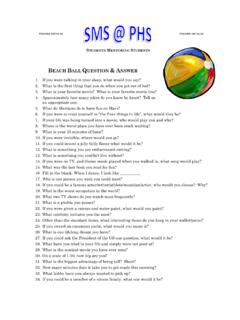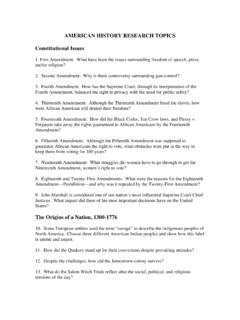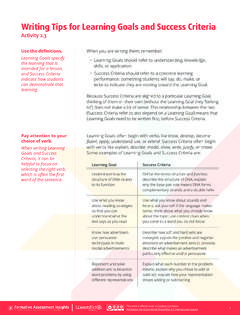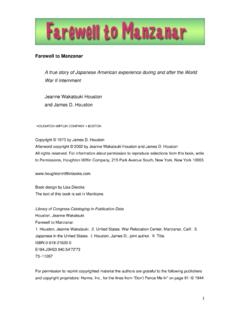Transcription of Self-assessment Checklist Cultural Competence
1 1 Vancouver Island Multicultural SocietyCultural Competence Self-assessment ChecklistCentral Vancouver Island Multicultural Society 2 Cultural Competence Self-assessment Checklist This Self-assessment tool is designed to explore individual Cultural Competence . Its purpose is to help you to consider your skills, knowledge, and awareness of yourself in your interactions with others. Its goal is to assist you to recognize what you can do to become more effective in working and living in a diverse environment. The term culture includes not only culture related to race, ethnicity and ancestry, but also the culture ( beliefs, common experiences and ways of being in the world) shared by people with characteristics in common, such as people with disabilities, people who are Lesbian Bisexual, Gay and Transgender (LGBT), people who are deaf, members of faith and spiritual communities, people of various socio-economic classes, etc.
2 In this tool, we are focusing on race, ethnicity and ancestry. However, remember that much of the awareness, knowledge and skills which you have gained from past relationships with people who are different from you are transferable and can help you in your future relationships across difference. Read each entry in the Awareness, Knowledge and Skills sections Place a check mark in the appropriate column which follows. At the end of each section add up the number of times you have checked that column. Multiple the number of times you have checked Never by 1, Sometimes/Occasionally by 2, Fairly Often/Pretty well by 3 and Always/Very Well by 4. The more points you have, the more culturally competent you are becoming. This is simply a tool. This is not a test.
3 The rating scale is there to help you identify areas of strength and areas that need further development in order to help you reach your goal of Cultural Competence . Remember that Cultural Competence is a process, and that learning occurs on a continuum and over a life time. You will not be asked to show anyone your answers unless you choose to do so. While you complete this assessment, stay in touch with your emotions and remind yourself that learning is a journey. 3 Awareness Never Sometimes/occasionally Fairly Often/Pretty Well Always/very well Value Diversity I view human difference as positive and a cause for celebration Know myself I have a clear sense of my own ethnic, Cultural and racial identity Share my culture I am aware that in order to learn more about others I need to understand and be prepared to share my own culture Be aware of areas of discomfort I am aware of my discomfort when I encounter differences in race, colour, religion, sexual orientation, language, and ethnicity.
4 Check my assumptions I am aware of the assumptions that I hold about people of cultures different from my own. Challenge my stereotypes I am aware of my stereotypes as they arise and have developed personal strategies for reducing the harm they cause. Reflect on how my culture informs my judgement I am aware of how my Cultural perspective influences my judgement about what are appropriate , normal , or superior behaviours, values, and communication styles. Accept ambiguity I accept that in cross Cultural situations there can be uncertainty and that uncertainty can make me anxious. It can also mean that I do not respond quickly and take the time needed to get more information. Be curious I take any opportunity 4 to put myself in places where I can learn about difference and create relationships Aware of my privilege if I am White If I am a White person working with an Aboriginal person or Person of Colour, I understand that I will likely be perceived as a person with power and racial privilege, and that I may not be seen as unbiased or as an ally.
5 1 pt x 2 pt x 3 pt x 4 pt x 5 Knowledge Gain from my mistakes I will make mistakes and will learn from them Assess the limits of my knowledge I will recognize that my knowledge of certain Cultural groups is limited and commit to creating opportunities to learn more Ask questions I will really listen to the answers before asking another question Acknowledge the importance of difference I know that differences in colour, culture, ethnicity etc. are important parts of an individual s identity which they value and so do I. I will not hide behind the claim of colour blindness . Know the historical experiences of non-European Canadians I am knowledgeable about historical incidents in Canada s past that demonstrate racism and exclusion towards Canadians of non-European heritage ( the Chinese Head Tax, the Komagata Maru, Indian Act and japanese internment ).
6 Understand the influence culture can have I recognize that cultures change over time and can vary from person to person, as does attachment to culture Commit to life-long learning I recognize that achieving Cultural Competence involves a commitment to learning over a life-time Understand the impact of racism, sexism, homophobia .. I recognize that stereotypical attitudes and discriminatory actions can dehumanize, even encourage violence against individuals because of their 6 membership in groups which are different from myself Know my own family history I know my family s story of immigration and assimilation into Canada Know my limitations I continue to develop my capacity for assessing areas where there are gaps my knowledge 1 pt x 2 pt x 3 pt x 4 pt x 7 Skills Adapt to different situations I am developing ways to interact respectfully and effectively with individuals and groups Challenge discriminatory and/or racist behaviour I can effectively intervene when I observe others behaving in racist and/or discriminatory manner.
7 Communicate across cultures I am able to adapt my communication style to effectively communicate with people who communicate in ways that are different from my own. Seek out situations to expand my skills I seek out people who challenge me to maintain and increase the cross- Cultural skills I have. Become engaged I am actively involved in initiatives, small or big, that promote understanding among members of diverse groups. Act respectfully in cross- Cultural situations I can act in ways that demonstrate respect for the culture and beliefs of others. Practice Cultural protocols I am learning about and put into practice the specific Cultural protocols and practices which necessary for my work. Act as an ally My colleagues who are Aboriginal, immigrants or People of Colour consider me an ally and know that I will support them with culturally appropriate ways.
8 Be flexible I work hard to understand the perspectives of others and consult with my diverse colleagues 8 about culturally respectful and appropriate courses of action. Be adaptive I know and use a variety of relationship building skills to create connections with people who are different from me. 1 pt x 2 pt x 3 pt x 4 pt x











